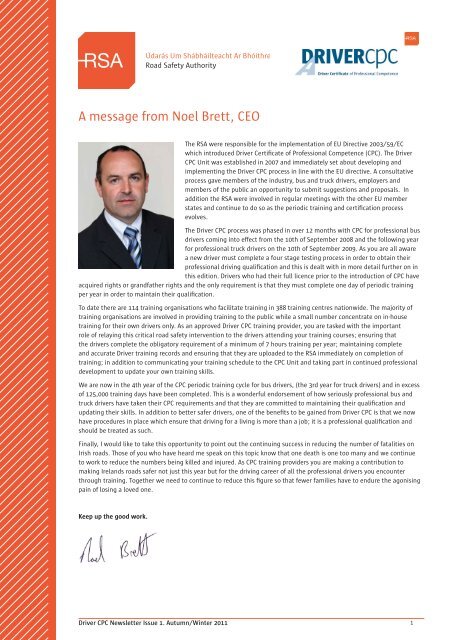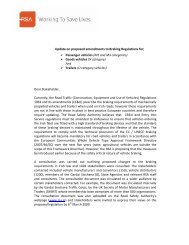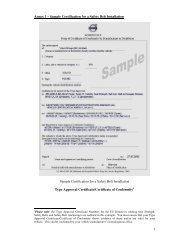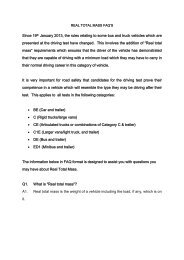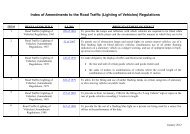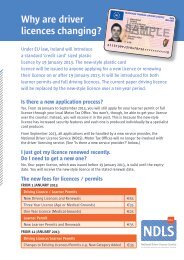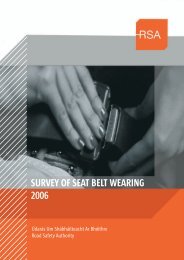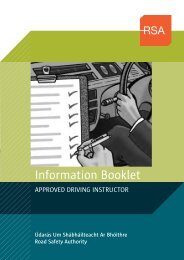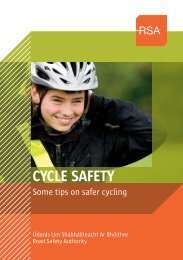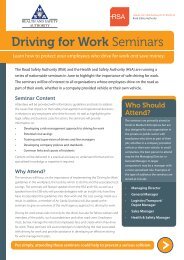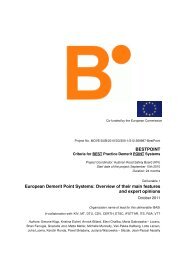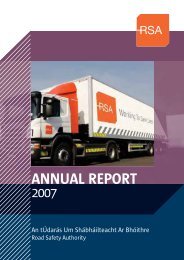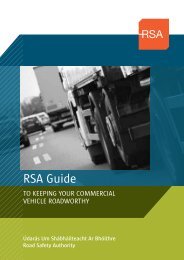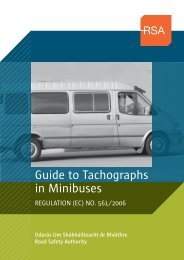CPC Newsletter - Road Safety Authority
CPC Newsletter - Road Safety Authority
CPC Newsletter - Road Safety Authority
Create successful ePaper yourself
Turn your PDF publications into a flip-book with our unique Google optimized e-Paper software.
A message from Noel Brett, CEO<br />
The RSA were responsible for the implementation of EU Directive 2003/59/EC<br />
which introduced Driver Certificate of Professional Competence (<strong>CPC</strong>). The Driver<br />
<strong>CPC</strong> Unit was established in 2007 and immediately set about developing and<br />
implementing the Driver <strong>CPC</strong> process in line with the EU directive. A consultative<br />
process gave members of the industry, bus and truck drivers, employers and<br />
members of the public an opportunity to submit suggestions and proposals. In<br />
addition the RSA were involved in regular meetings with the other EU member<br />
states and continue to do so as the periodic training and certification process<br />
evolves.<br />
The Driver <strong>CPC</strong> process was phased in over 12 months with <strong>CPC</strong> for professional bus<br />
drivers coming into effect from the 10th of September 2008 and the following year<br />
for professional truck drivers on the 10th of September 2009. As you are all aware<br />
a new driver must complete a four stage testing process in order to obtain their<br />
professional driving qualification and this is dealt with in more detail further on in<br />
this edition. Drivers who had their full licence prior to the introduction of <strong>CPC</strong> have<br />
acquired rights or grandfather rights and the only requirement is that they must complete one day of periodic training<br />
per year in order to maintain their qualification.<br />
To date there are 114 training organisations who facilitate training in 388 training centres nationwide. The majority of<br />
training organisations are involved in providing training to the public while a small number concentrate on in-house<br />
training for their own drivers only. As an approved Driver <strong>CPC</strong> training provider, you are tasked with the important<br />
role of relaying this critical road safety intervention to the drivers attending your training courses; ensuring that<br />
the drivers complete the obligatory requirement of a minimum of 7 hours training per year; maintaining complete<br />
and accurate Driver training records and ensuring that they are uploaded to the RSA immediately on completion of<br />
training; in addition to communicating your training schedule to the <strong>CPC</strong> Unit and taking part in continued professional<br />
development to update your own training skills.<br />
We are now in the 4th year of the <strong>CPC</strong> periodic training cycle for bus drivers, (the 3rd year for truck drivers) and in excess<br />
of 125,000 training days have been completed. This is a wonderful endorsement of how seriously professional bus and<br />
truck drivers have taken their <strong>CPC</strong> requirements and that they are committed to maintaining their qualification and<br />
updating their skills. In addition to better safer drivers, one of the benefits to be gained from Driver <strong>CPC</strong> is that we now<br />
have procedures in place which ensure that driving for a living is more than a job; it is a professional qualification and<br />
should be treated as such.<br />
Finally, I would like to take this opportunity to point out the continuing success in reducing the number of fatalities on<br />
Irish roads. Those of you who have heard me speak on this topic know that one death is one too many and we continue<br />
to work to reduce the numbers being killed and injured. As <strong>CPC</strong> training providers you are making a contribution to<br />
making Irelands roads safer not just this year but for the driving career of all the professional drivers you encounter<br />
through training. Together we need to continue to reduce this figure so that fewer families have to endure the agonising<br />
pain of losing a loved one.<br />
Keep up the good work.<br />
Driver <strong>CPC</strong> <strong>Newsletter</strong> Issue 1. Autumn/Winter 2011 1
Background to Driver <strong>CPC</strong><br />
Welcome to the first edition of the Driver <strong>CPC</strong> newsletter! It is our intention to publish this<br />
newsletter twice yearly to bring you news and updates on Driver <strong>CPC</strong> as well as news and<br />
initiatives from across the RSA.<br />
As you will be aware Driver <strong>CPC</strong> was introduced across the EU in 2008 for professional bus drivers and 2009 for<br />
professional truck drivers. Its purpose is to set and maintain high standards of road safety, health and safety and driving<br />
among professional drivers of buses and trucks. The legal basis for driving the Driver <strong>CPC</strong> programme is EU Directive<br />
2003/59/EC which was transposed into Irish law in 2008 as SI No 359 of 2008.<br />
Driver <strong>CPC</strong> will benefit both the drivers and their employers by:<br />
• Ensuring that all professional drivers have good driving and safety standards and that those standards are<br />
maintained throughout their career;<br />
• Creating a common standard for the training and testing of professional drivers throughout the EU;<br />
• Reducing fatalities and serious injuries on Irish roads. The RSA’s target is for Ireland to have one of the lowest<br />
casualty rates in Europe.<br />
• Promoting Eco-driving which will result in smarter and more fuel-efficient driving, in addition to reducing wear and<br />
tear on the vehicle.<br />
A professional driver is one who drives a bus or truck for a living and all professional drivers must have and maintain a<br />
Driver <strong>CPC</strong> qualification.<br />
Professional drivers fall into two categories from a Driver <strong>CPC</strong> perspective:<br />
1. Drivers who were already working as professional drivers when the scheme was put in place. These drivers are<br />
deemed to have acquired rights.<br />
2. Drivers who are new to the profession and who must pass a four stage exam process in order to obtain their <strong>CPC</strong><br />
qualification – initial qualification.<br />
The provisions for retaining a <strong>CPC</strong> qualification apply equally to both new and existing drivers and all must complete 1<br />
day of periodic training each year. Drivers who have acquired rights must complete 35 hours periodic training (1 day per<br />
year). All bus drivers with acquired rights should have their 3rd day of periodic training completed and similarly all truck<br />
drivers with acquired rights should have their second day of periodic training completed.<br />
Drivers who have completed the 4 stage testing process and obtained their initial qualification have 1 year from the date<br />
that they passed their final test which gave them their <strong>CPC</strong> qualification, to complete their first day of periodic training<br />
and they must complete one day of training per year thereafter.<br />
In this newsletter we will look at information of relevance to both existing and<br />
new <strong>CPC</strong> drivers.<br />
If there is any topic or issue you would like to see covered in a future edition of<br />
this newsletter, please contact the Driver <strong>CPC</strong> Unit with your comments and/or<br />
suggestions. While we cannot guarantee to cover all suggestions we will look to<br />
address the more common topics and issues.<br />
Please forward all comments/suggestions to the Driver <strong>CPC</strong> Unit:<br />
Via email: cpc@rsa.ie please highlight the subject as: *Driver <strong>CPC</strong> <strong>Newsletter</strong>*<br />
By post: *Driver <strong>CPC</strong> <strong>Newsletter</strong>* Driver <strong>CPC</strong> Unit, <strong>Road</strong> <strong>Safety</strong> <strong>Authority</strong>,<br />
Primrose Hill, Ballina, Co. Mayo.<br />
Driver <strong>CPC</strong> <strong>Newsletter</strong> Issue 1. Autumn/Winter 2011 2
Driver <strong>CPC</strong> Unit<br />
There is an administrative unit in the RSA which was established for the specific purpose of<br />
managing, developing and implementing the Driver <strong>CPC</strong> process in Ireland. The <strong>CPC</strong> Unit was<br />
established towards the end of 2007 and now has a compliment of five staff members who are<br />
responsible for all aspects of Driver <strong>CPC</strong> such as:<br />
• Registration, approval and ongoing administration of training providers, centre’s and trainers;<br />
• Issue a unique identification number for each training centre, in addition to the secure log-in and training upload<br />
information;<br />
• Ensuring that all Driver training and test records are accurate and up to date;<br />
• Collect feedback from training attendees on the modules delivered;<br />
• Collect feedback from the training providers/trainers on the approved syllabus and training material for review and<br />
updating;<br />
• Approval of the Driver <strong>CPC</strong> periodic training syllabus and any necessary amendments/updates;<br />
• Monitor and evaluate Driver <strong>CPC</strong> training delivered by all training providers and their trainers;<br />
• Deal with complaints and disputes received from training organisations, trainers, drivers, etc.;<br />
• Manage the quality assurance process for training providers, centres and drivers;<br />
• Manage the quality assurance process for the training syllabus;<br />
• Monitoring of training centres to ensure the standards are maintained;<br />
• Audit approved training providers to ensure requirements and standards regarding record keeping, driver<br />
information and all associated documentation is in order and is stored appropriately and securely;<br />
• Deal with calls and queries from the training providers, trainers, drivers and members of the public.<br />
The Driver <strong>CPC</strong> Unit can be contacted:<br />
Driver <strong>CPC</strong> Unit<br />
<strong>Road</strong> <strong>Safety</strong> <strong>Authority</strong><br />
Primrose Hill<br />
Moy Valley Business Park<br />
Ballina<br />
Co Mayo<br />
Email: cpc@rsa.ie<br />
Tel: 096 25015<br />
Driver <strong>CPC</strong> logo and its use<br />
As an approved Driver <strong>CPC</strong> training provider you are entitled to use the Driver <strong>CPC</strong> logo on<br />
promotional materials such as on signs, advertising, training receipts, training literature, official<br />
website, work vehicle or similar items which promote your business as an approved Driver <strong>CPC</strong><br />
training provider. The logo and instructions for its use are contained on the Driver <strong>CPC</strong> training<br />
CD which all training providers receive on approval. Care must be taken to ensure that the logo is<br />
used correctly and that the instructions for its proper use are fully adhered to. The use of the <strong>CPC</strong><br />
logo is a privilege and should be treated as such and any unofficial use of same is prohibited. If<br />
you have any query regarding the use of the logo please contact the Driver <strong>CPC</strong> Unit who will be<br />
happy to assist with your query.<br />
Driver <strong>CPC</strong> <strong>Newsletter</strong> Issue 1. Autumn/Winter 2011 3
RSA UPDATE<br />
What’s new in the RSA?<br />
Essential Driver Training (EDT) Essential Driver Training (EDT) for new car learner permit holders was rolled out on 4th April<br />
2011 and consists of 12 hourly lessons covering particular driving skills and behaviours.<br />
The particular skills and behaviours that form the lesson content were decided upon following an analysis of causation factors in<br />
fatal and serious collisions over a ten year period in Ireland. Following that a consultation process involving stakeholders as well as<br />
international experts and all driver testers was carried out.<br />
When a learner driver starts their first EDT lesson, they will be given an official logbook from their Approved Driving Instructor (ADI) to<br />
record the details of their training and progress, as well as necessary preparation for their next lessons. When they complete an EDT<br />
lesson, the ADI will stamp the relevant section of the driver’s logbook and record some feedback on how well or whether they met<br />
the lesson objectives. To meet the lesson objectives they must prepare properly, practice with a Sponsor and they may need to take<br />
additional instruction. The learner driver must complete twelve lessons before they can sit their driving test<br />
The twelve lessons will be delivered by ADIs. In order to maximise the gain from the programme learner drivers will have to practice<br />
continually with an accompanied driver (Sponsor) and may need to also take further lessons with their ADI. The RSA has completed<br />
a briefing process for ADI’s across the country to help explain the thinking behind EDT and the various implementation aspects to the<br />
programme. EDT promotes the role of the accompanying driver or Sponsor in overseeing the necessary practice for the learner; it<br />
also encourages the learner to carry out self-reflection on his/her driving abilities at various stages of the programme.<br />
A number of supporting documents have been developed around EDT-<br />
LDT Syllabus<br />
EDT Syllabus<br />
EDT Learner Driver<br />
Information Booklet<br />
EDT ADI Guidelines<br />
EDT Logbook<br />
This is a syllabus covering all the skills a safe competent driver needs.<br />
This is a syllabus covering the twelve EDT lessons<br />
This is a booklet for learners on practical aspects of EDT<br />
This is a booklet for ADIs on the implementation of EDT<br />
This is the Logbook on which lesson feedback is recorded and has areas for self-reflection by<br />
the learner and comments by the Sponsor<br />
Initial Basic Training (IBT) — Motorcyclists Initial Basic Training for motorcyclists became a legal requirement in<br />
Ireland on 6 December 2010. This means that any person taking out a first learner permit with a commencement date on or after<br />
6 December 2010 must successfully complete a course of basic training commonly known as IBT, before being allowed to ride<br />
unaccompanied by an approved IBT trainer, on a public road.<br />
Courses are only available at officially approved IBT training centres and may only be delivered by RSA approved IBT Trainers.<br />
Both centres and trainers will be issued with a certificate of approval and learner riders will be advised to check to make sure that<br />
the trainer and centre is approved. If you require information on how to apply for approval as either a trainer or Centre provider<br />
please contact the ADI unit at Tel: (096) 25007<br />
The IBT course for motorcyclists covers four modules that must be completed in sequence. As a learner progresses through the<br />
course the IBT trainer will complete the relevant sections of the students personal log book and once the course has been fully<br />
completed will issue the learner with a certificate of satisfactory completion.<br />
A learner may at a later date, opt to ride a larger or manual type motorcycle, or convert from a tricycle to a two wheeled<br />
machine. A conversion module exists so that learners get necessary training in the larger or manual type of motorcycle without<br />
repeating the entire course again.<br />
Once a student has completed his/her IBT they may ride unaccompanied on a public road and should have their learner permit<br />
and certificate of satisfactory completion with them. Learners will be encouraged to continue to practice their riding skills and take<br />
further training with either an approved IBT trainer or an RSA motorcycle ADI, to help prepare them for their practical driving test.<br />
Learners will be advised that the learning phase will continue for many years and that even the most experienced of riders tell us<br />
that they never stop learning from their experience. Knowing and accepting this will help frame a positive attitude and will help<br />
to produce better safer riders.<br />
Initial Basic Training (IBT) – Motorcyclists The medical standards for driver licensing purposes in relation to epilepsy,<br />
diabetes and eyesight were amended in late 2010. Details of the changes are contained in the medical aspects booklet which can be<br />
accessed at www.rsa.ie/licence-renewal. Further information regarding other medical issues, licence renewals and the associated<br />
application forms etc are available for download from this webpage.<br />
Driver <strong>CPC</strong> <strong>Newsletter</strong> Issue 1. Autumn/Winter 2011 4
FOCUS ON<br />
Becoming a Professional Driver<br />
Drivers who wish to drive a bus or truck for a living must obtain their ‘Driver <strong>CPC</strong> qualification’ by<br />
completing and passing a 4 stage testing process. After first completing and passing the ‘learner<br />
permit’ theory test, drivers can proceed on to the first steps in the Driver <strong>CPC</strong> testing process<br />
which are two <strong>CPC</strong> theory tests.<br />
1. Driver <strong>CPC</strong> Multiple Choice Theory Test:<br />
This test consists of 100 multiple choice questions with 61 correct answers needed to pass. The question is<br />
given with 4 possible answers and the driver has to highlight the answer they feel is correct.<br />
2. Driver <strong>CPC</strong> Case Study Theory Test:<br />
The second test consists of three case studies; these are short scenarios which describe various situations which a<br />
driver might face and there are 15 questions on each case study (45 in total). To pass this test the driver must give<br />
correct answers to 28 of the 45 questions; a minimum of at least 5 questions must be passed on each case study.<br />
Each stage takes 2 hours, and it is possible to take both tests on the<br />
same day or over two different days, whichever the candidate prefers.<br />
The tests cost €70 each and can be booked on line at www.dtts.ie or<br />
by phone – 1890 606 106.<br />
To assist drivers in preparing for their tests, Prometric have published<br />
a training manual which is available for purchase online or by phone<br />
www.dtts.ie or 1890 606 106. In addition to this careful study of the<br />
following publications will assist in preparing for the theory tests:<br />
• The Rules of the <strong>Road</strong>;<br />
• Driving Goods Vehicles – the official Driver Standards Agency (DSA) UK Guide<br />
• Driving Buses and Coaches – the official Driver Standards Agency (DSA) UK Guide<br />
Driving & <strong>CPC</strong> Practical Tests:<br />
Once a driver has completed and passed the two <strong>CPC</strong> theory tests, they can apply for the driving and practical tests.<br />
The driving test takes 90 minutes. The practical test involves a 30 minute test on areas such as safety; passenger<br />
comfort; legal matters relating to driving; vehicle loading and stability etc. The driving and practical tests take place<br />
in any bus/truck test location, a list of test centres can be found on the Driving Test website: www.drivingtest.ie<br />
Applications for the driving and practical test are available online www.drivingtest.ie<br />
Application forms can also be downloaded from this website and posted to:<br />
Driver Testing Section,<br />
<strong>Road</strong> <strong>Safety</strong> <strong>Authority</strong>,<br />
Primrose Hill,<br />
Ballina,<br />
Co. Mayo.<br />
Telephone (096) 78225; locall 1890 40 60 40<br />
Driver <strong>CPC</strong> <strong>Newsletter</strong> Issue 1. Autumn/Winter 2011 5
Prometric/RSA Theory Tests<br />
In addition to the Driver <strong>CPC</strong> theory tests, Prometric facilitate all theory tests on behalf<br />
of the RSA and provide services and assistance to the driver such as:<br />
• If you wish to cancel or reschedule a theory test;<br />
• If you require a theory test in Irish;<br />
• Provision of a translator – learner permit theory tests only;<br />
• If you wish to apply for the ADI theory tests;<br />
• If you wish to purchase any theory test study material<br />
Theory test bookings and enquiries can be made online at www.theorytest.ie or by telephone —<br />
locall: 1890 606 106.<br />
Review of Driver <strong>CPC</strong> Training Syllabus<br />
The current syllabus for Driver <strong>CPC</strong> was developed in line with EU requirements and in association with the transport<br />
industry in both the public and private sector. The RSA receive feedback from all drivers who attend the training and the<br />
vast majority are satisfied with the process. Due to ongoing amendments and changes to legislation etc, the training<br />
syllabus needs to be constantly reviewed in order to ensure that the material is as consistent, relevant and up to date<br />
as possible. A process has been put in place to review all training modules and a specific review working group was<br />
established to review module 1. ‘Control of Vehicle and Eco Driving Techniques’. This review is now complete and a<br />
review of module 4 ‘Role of the Professional Driver in the Transport Industries’ is now underway. Membership of the<br />
review working group comprises of RSA representatives, Driver <strong>CPC</strong> trainers, individuals from transport organisations<br />
and professional drivers. The objective of the group is to ensure that all the periodic training modules are interactive,<br />
informative and develops the benefits of why Driver <strong>CPC</strong> was implemented in the EU.<br />
A new review team will be established for each relevant module and will reflect any updates to the syllabus, legislation<br />
and the Rules of the <strong>Road</strong>. Before the start of each review the <strong>CPC</strong> Unit will invite all approved training providers to<br />
nominate a trainer from their organisation who they feel would have a strong contribution to make to the review of the<br />
particular module.<br />
While it may not be possible to accommodate all nominees on a particular module review group, there will be ongoing<br />
opportunities throughout the course of the project to nominate a representative as the other training modules are<br />
reviewed, all training providers will be advised as it arises.<br />
Once each module has been reviewed and amended it will be circulated to all training providers to replace the existing<br />
training material. It is hoped that the project will be complete by the end of 2012.<br />
Training providers, trainers and drivers are welcome to submit any feedback from their training experiences to date<br />
regarding the material in use or the process in general. All comments and suggestions will be taken into consideration.<br />
Information note for Trainers<br />
Drivers who are dual licence holders should be mindful of the sequence in which they complete their Driver <strong>CPC</strong> training<br />
in order to avoid unnecessary duplication of training modules. Consideration should be given to maintaining both<br />
licence categories each year therefore it is recommended that Module 5 ‘The Professional Truck Driver’ and Module 6<br />
‘The Professional Bus Driver’ should be completed by the drivers in the same training year in order to align their<br />
ongoing training.<br />
Driver <strong>CPC</strong> <strong>Newsletter</strong> Issue 1. Autumn/Winter 2011 6


